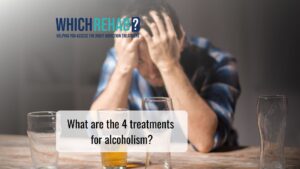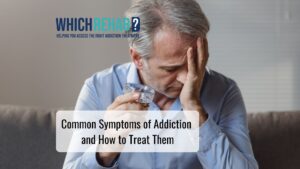Rehab facilities and treatment centres play a crucial role in providing effective treatment options for individuals struggling with substance use disorders. With various types of treatment settings, including outpatient and residential rehabs, and the use of medication-assisted treatment, behavioural therapies, and mental health services, these facilities aim to help individuals achieve long-term recovery and improve their quality of life.
But, you might be asking yourself, ‘does rehab work’?
It’s important to understand the success rate of rehabilitation programs to assess their effectiveness in treating drug addiction and providing a pathway towards a healthier and more fulfilling life.
In this article, we will explore the success rate of rehab programs and the factors that contribute to a successful recovery process.
Success Rate of Rehabilitation Programs
Alcohol Rehab Success Rates
Alcohol rehab programs have shown promising success rates in helping individuals overcome alcohol addiction and maintain long-term sobriety. Studies have indicated that approximately 40 to 60 per cent of individuals who complete alcohol rehab programs maintain their sobriety for one year or more. Additionally, these programs have been effective in reducing overall alcohol use, even in cases where complete abstinence is not achieved.
One key factor contributing to the success rates of alcohol treatment is the inclusion of 12-step support programs, such as Alcoholics Anonymous (AA). These programs offer peer support, guidance, and a structured approach to recovery. Research has consistently shown that active participation in 12-step programs significantly improves the likelihood of successful outcomes in alcohol treatment.
Alcohol rehab centres provide a range of activities and a structured environment to help individuals on their journey to recovery. These activities may include individual therapy sessions, group counselling sessions, educational workshops, and holistic therapies like meditation or yoga. The centres also employ medical professionals who can address co-occurring disorders and provide medication-assisted treatment, if necessary.
By focusing on individualised treatment plans, comprehensive therapy approaches, and aftercare support, alcohol rehab programs aim to improve the quality of life for individuals struggling with alcohol addiction. Though it’s a long and rough road, with the right support and resources, individuals can achieve long-term recovery and lead healthier, fulfilling lives.
Drug Rehab Success Rates
Drug rehab programs have varying success rates, which can be influenced by several factors. According to research, the success rates of drug rehab treatments range from 30% to 70%, depending on the individual’s commitment to the treatment process and the effectiveness of the program.
Factors that contribute to the effectiveness of drug rehab treatments include the duration of treatment and the types of therapies utilised. Studies have shown that longer durations of treatment, typically lasting 90 days or more, have higher success rates compared to shorter treatment durations.
Additionally, the use of evidence-based therapies, such as cognitive-behavioural therapy (CBT) and motivational interviewing, has been proven to significantly improve treatment outcomes. These therapies help individuals develop coping skills, address underlying issues, and modify behaviours associated with addiction.
Medication-assisted treatment (MAT) is another crucial component of successful drug rehab programs. MAT combines medications, such as methadone or buprenorphine, with behavioural therapies to address withdrawal symptoms and cravings. Research suggests that MAT can lead to better engagement in treatment and reduce the risk of relapse.
The success rates of different types of drug rehab settings also vary. Inpatient treatment programs, where individuals reside at a residential facility, generally have higher success rates compared to outpatient programs due to the 24/7 support and structured environment provided. However, outpatient programs can also be effective, particularly for individuals with mild to moderate addiction issues.
Relapse is a common challenge in addiction recovery, and its occurrence can affect overall success rates. It is important to understand that relapse is not a sign of failure but rather a part of the recovery process. With the right support and continued treatment, individuals who experience relapse can get back on track and achieve long-term recovery.
Behavioural Rehab Success Rates
Behavioural rehab programs have also shown promising success rates in treating addiction and substance misuse. These programs focus on modifying patterns of thought and behaviour to promote healthy lifestyles and long-term recovery. The effectiveness of these programs in achieving positive outcomes can be attributed to several factors.
One key factor is the quality of care provided. Treatment facilities that offer comprehensive and personalised treatment plans, with a multidisciplinary team of medical professionals, therapists, and support staff, tend to have higher success rates. These facilities provide a safe and supportive environment for individuals to address their addiction and develop the necessary tools for recovery.
Another contributing factor is the level of patient involvement in the treatment process. Active participation in therapy sessions, group counselling, and support groups can significantly enhance treatment outcomes. When individuals take ownership of their recovery journey, they are more likely to stay committed to the treatment plan and apply the strategies learned in their everyday lives.
Success rates for behavioural rehab programs are typically measured using various metrics. These may include the percentage of individuals who complete the program, improvement in overall mental health and quality of life, and the rate of relapse post-treatment. These measurements help determine the effectiveness of the program and provide valuable insights for ongoing improvements and refinements.
Mitigating Factors to Consider

According to a 2012 study conducted by the NHS, there are several mitigating factors that can significantly affect the success rates of rehab clinics. These factors include the percentage of clients completing treatment, the number of positively and negatively discharged clients, and the rate of dropouts before completing the program.
Rehab Completion
The study found that the completion of treatment plays a crucial role in determining success rates. Clients who successfully complete their treatment program have higher chances of maintaining long-term recovery. In the study, clinics with higher completion rates exhibited higher success rates overall.
The rate of dropouts before completing the program is another mitigating factor. Clients who leave the program prematurely may not have fully benefited from the therapy and support offered, decreasing their chances of successful recovery.
Positive and negative discharge
When thinking about the question, ‘does rehab work?’, it’s vital to consider how rehab finished.
Positive discharge, where clients successfully complete treatment and are discharged with a solid support system in place, also plays a significant role in success rates. These individuals are more likely to have better outcomes due to the ongoing support they receive post-treatment.
On the other hand, negative discharge, which involves clients being discharged against medical advice or due to non-compliance with treatment protocols, can negatively impact success rates. These individuals may face challenges in maintaining recovery without the necessary support and follow-up care.
Commitment and Attitude
Commitment and attitude are crucial in determining the success of rehab. Individuals who are actively engaged in their treatment, with a positive mindset and willingness to change, tend to have higher success rates.
Private vs Free
Private rehab clinics often have higher success rates compared to NHS and community-based services. This may be attributed to the personalised and comprehensive treatment plans, along with the dedicated staff and resources available in private clinics.
In conclusion, the success rates of rehab clinics are influenced by various mitigating factors, including completion of treatment, discharge status, dropouts, commitment, attitude, and the type of clinic. Understanding and addressing these factors can help improve treatment outcomes and support individuals in their recovery journey.
Addiction Relapse: The Reality and Challenges
Relapse is a common occurrence for individuals recovering from addiction, and it can be disheartening for both the person in recovery and their loved ones. Addiction is a chronic condition, and the risk of relapse is an unfortunate reality and plays a crucial part in whether rehab does or doesn’t work.
While the goal of rehab is to provide individuals with the tools and support necessary for long-term recovery, relapse can still happen. It is important to understand that relapse does not signify failure or weakness. Instead, it is an opportunity to reassess and continue the recovery journey.
Overcoming addiction requires ongoing effort, and relapse should be seen as a bump in the road rather than a complete derailment. In this section, we will explore the reasons behind addiction relapse, the challenges individuals face, and the strategies to prevent and address relapse effectively.
Why Relapse Happens
Relapse can be a common occurrence in addiction recovery, and understanding why it happens is crucial for long-term success. There are several common reasons why people relapse after completing treatment.
Poor Lifestyle
One major factor is the adoption of a poor lifestyle. Many people may have developed unhealthy habits during their addiction, such as a lack of structure, poor eating habits, and neglect of self-care. Without addressing and changing these aspects, individuals can find themselves slipping back into old patterns of substance use.
Low Motivation
Low motivation is another reason for relapse. It is not uncommon for individuals to experience periods of decreased motivation after completing treatment. This can make it challenging to stay committed to their recovery and resist the temptation to return to substance use.
Low Self-Esteem
Low self-esteem is also linked to relapse. Many people struggling with addiction have underlying feelings of shame, guilt, and low self-worth. If these feelings are not addressed and a healthy self-image is not developed, individuals may turn to drugs or alcohol as a way to cope with their negative emotions.
The belief that Your Addiction is Cured
Another crucial factor is the misconception that they are cured or do not have a problem anymore. Some individuals may assume that once they have successfully completed a treatment program, they are no longer at risk of relapse. This sense of complacency can be dangerous, as it disregards the ongoing work and commitment required for long-term recovery.
Relapse rates vary for different substances and individuals, but it is important to recognise that relapse does not mean failure. Rather, it highlights the need for ongoing support systems, therapy, and self-care to maintain sobriety and navigate the challenges of addiction recovery.
By addressing these common reasons for relapse and implementing effective strategies, individuals can enhance their chances of sustaining a healthy and substance-free lifestyle.
Are you in the midst of a relapse, or know someone who is? Get in touch with our dedicated and compassionate team today to find the help you need to get your life back on track.
How to Prevent Addiction Relapse

Preventing addiction relapse requires a comprehensive and holistic approach, addressing not only the physical dependence on substances but also the underlying causes and triggers of addiction. One of the most crucial strategies is attending treatment regularly and engaging in therapies that address the root causes of addiction
Professional Therapies
Cognitive Behavioural Therapy (CBT) is highly effective in preventing relapse by helping individuals modify negative thought patterns and develop healthier coping mechanisms. It teaches them to identify and change the thoughts and behaviours that contribute to substance use. Somatic Experiencing therapy can also be beneficial, as it focuses on healing trauma and reducing the impact of traumatic experiences on addictive behaviours.
Biofeedback, an evidence-based technique, provides individuals with real-time information about their physiological responses to stress and helps them learn how to regulate these responses. This can be especially helpful in managing triggers and preventing relapse.
For those seeking advanced and evidence-based therapies, luxury rehab programs often offer a range of specialised treatments tailored to individual needs. These programs provide a high level of personalised care and access to cutting-edge therapies, maximising the chances of successful recovery and long-term sobriety.
Free Options
On a simpler end of the scale, engaging in regular exercise can significantly reduce the risk of relapse. Exercise not only improves physical health but also promotes the release of endorphins, which can improve mood and reduce cravings.
Mutual support groups, such as 12-step programs like Alcoholics Anonymous or Narcotics Anonymous, can provide individuals with a sense of community and ongoing support, which is essential for maintaining sobriety.
Cost of Rehabilitation Programs and Insurance Coverage Options
The cost of rehab programs can vary significantly depending on the provider, settings, and type of treatment. Let’s explore some of the different cost considerations and insurance coverage options.
For individuals accessing the National Health Service (NHS), the cost of rehab treatment can be covered by the government, making it free for patients. This ensures that individuals can receive the help they need without financial burden.
On the other hand, private rehab clinics and facilities may have associated costs that individuals will need to cover. However, many health insurance policies offer coverage for mental health and addiction services, including rehab programs. It’s important for individuals to review their insurance policies to understand the extent of coverage available to them.
For those who do not have insurance or choose to self-pay, evaluating the cost of rehab compared to the ongoing costs of addiction is crucial. While the upfront cost of rehab may seem significant, it is essential to consider the long-term financial and personal benefits of getting sober and living a healthier, more fulfilling life.
Understanding the cost of rehabilitation programs and exploring insurance coverage options is an important step in accessing the necessary treatment for addiction. Each individual’s situation is unique, and it is recommended to consult with professionals or insurance providers to determine the most suitable and affordable options available.
So, does rehab work? Get help today
So now you know the ins and outs to the questions, ‘does rehab work’ and why it’s not a simple question to answer.
At Which Rehab, we’re here to help you or your loved one get the support they need. Despite the difficulties faced by those struggling with addiction and the seemingly challenging rehab success rate stats, getting help puts you in a far better position than trying to kick your addiction alone (read our blog ‘can you stop doing drugs without rehab?‘ for more on that subject).
To start your recovery journey, or to get it back on track, get in touch with our team of addiction professionals today. We’re here to help you break free from your addiction by getting you to the best rehab for your situation.
So what are you waiting for? Get in touch today to find hope for a better future.






